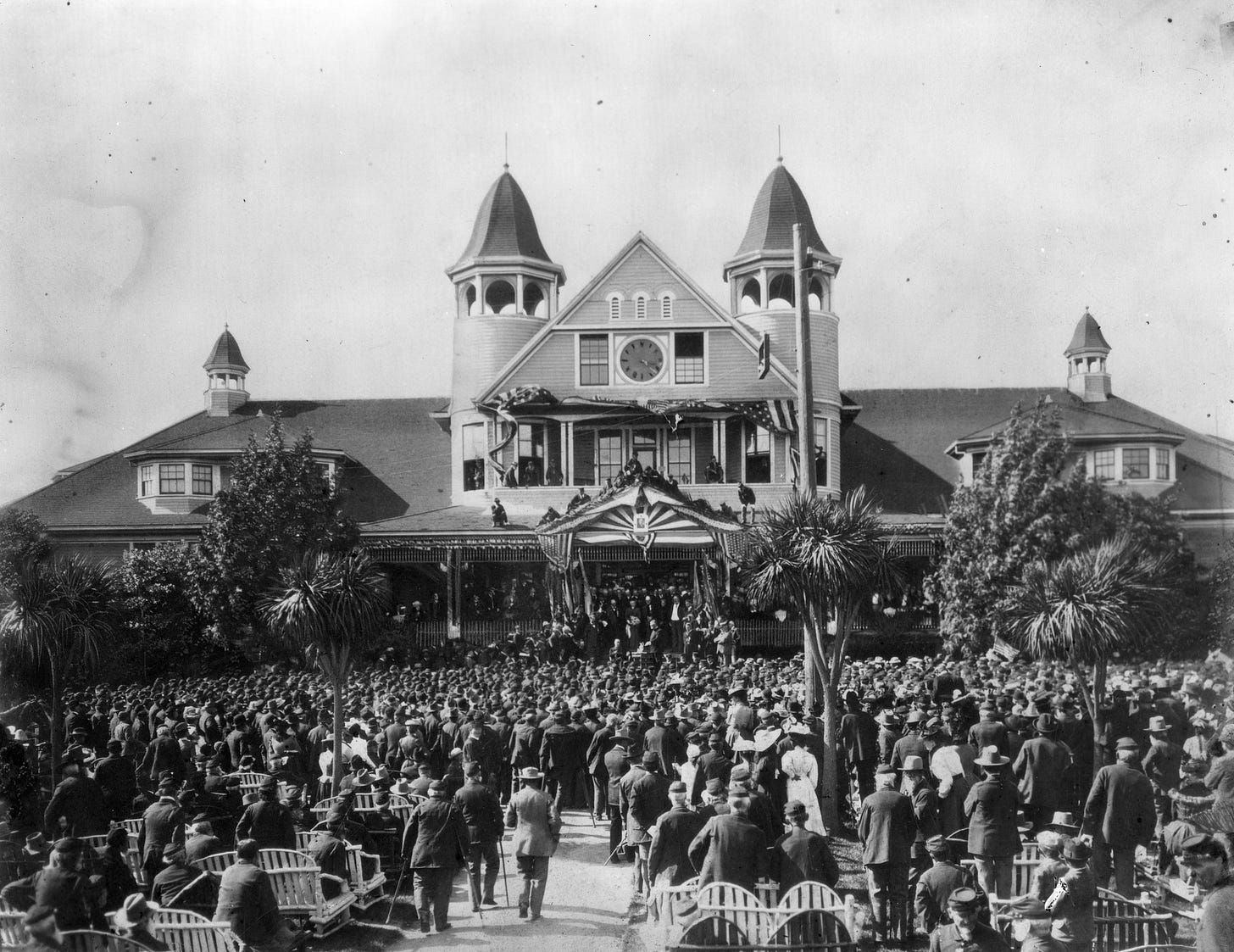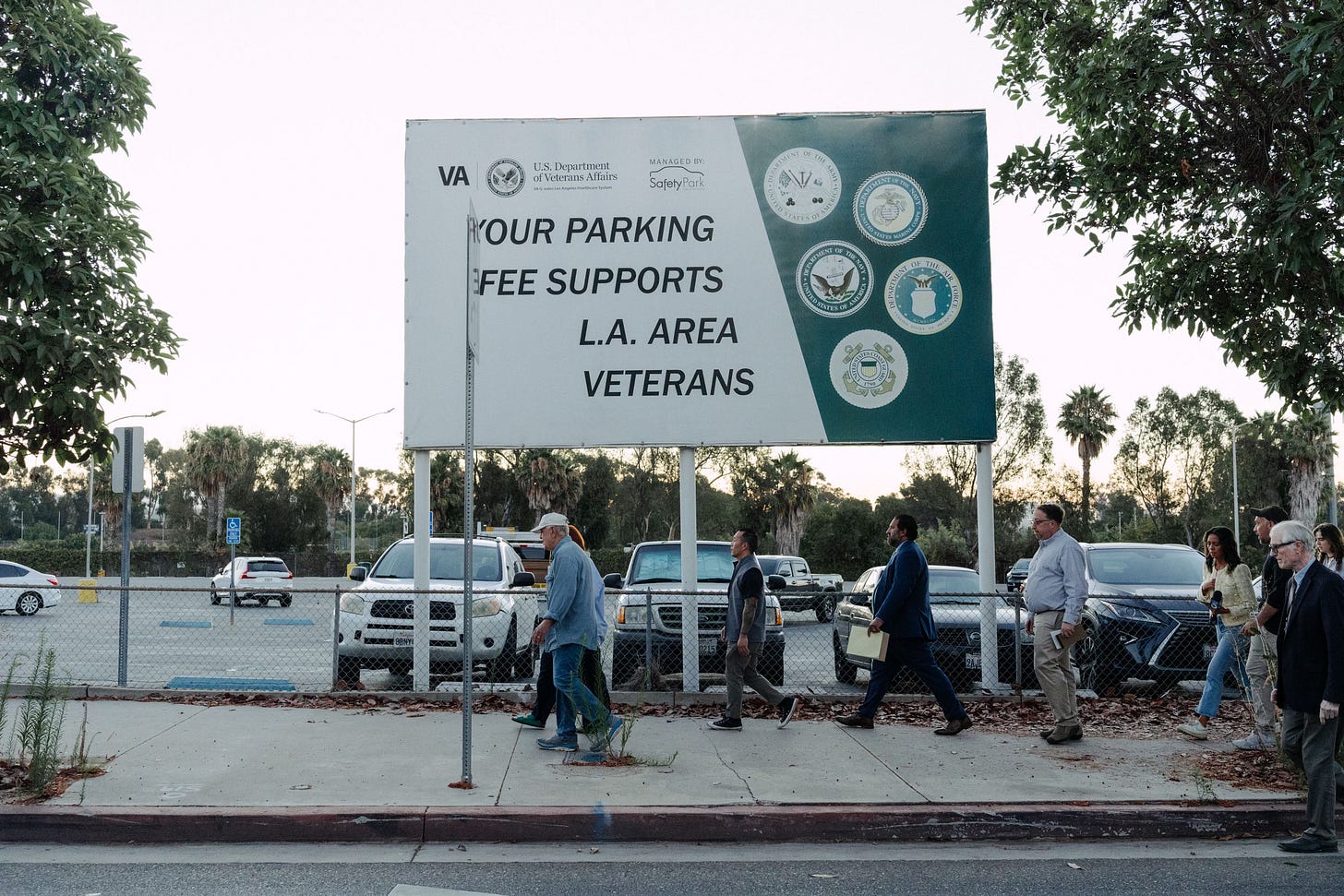Day 13: Judge Carter tires of "bureaucracies playing bumper cars”
A 50-year-old landfill on the West LA VA campus gets cited as a morass to development, yet it's surrounded by a private school, a public park, and veteran housing. What gives?

In the northwest area of the West LA VA campus sits a plot of land that, unlike the rest of the campus, is not being considered for temporary or permanent housing or any other amenity for veterans. Nonetheless, the plot — a former landfill — drew much scrutiny from Judge David Carter on Powers v. McDonough’s 13th day of proceedings.
The issue, which has been alluded to throughout the trial, was first raised by C. Brett Simms, executive director of the VA’s Office of Asset Enterprise Management, who continued his testimony from Monday regarding the state of infrastructure on the VA campus and the demands new housing would place on existing systems. The former landfill — which is now dormant — is currently complicating the occupancy of housing units due to open soon because of its proximity to them.
Later in the day, Chelsea Black, active chief of planning for campus, noted the concerns surrounding methane, which is a byproduct of landfills. While not toxic by itself, the gas can be explosive. The Los Angeles County Department of Public Health has issued a hold on occupancy until some methane-related risks can be addressed with monitoring equipment and other surveys and samples. The process could take a year or more.
Long Lead is reporting from Powers v. McDonough every day court is in session. Subscribe here to get our daily briefings sent direct to your inbox every morning:
Black testified to some of the obstacles the landfill presented. She noted that the landfill has been dormant for about 50 years and that no methane concerns had been documented.
However, in 2023, the LA County public health department sent a letter to the VA expressing concern about ongoing construction within a 1,000-foot radius of the landfill, Black testified. But the letter was not addressed to a specific person at the VA and as a result, the concerns in it were not looked into for a period of months.
Carter noted that currently occupied Buildings 205, 208, and 209 — which constitute 174 of the VA’s current 233 units of permanent supportive housing — are also within the 1,000-foot radius.
“We have a lot of veterans there,” Carter said. “I certainly don’t want to be complicit in some methane explosion.”
Black said she was “very frustrated” by the developments involving work stoppages due to the landfill. Nearby, housing currently under development were set to receive a temporary certificate of occupancy at the start of September.
“Let’s get down to the bottom of this,” Carter said, expressing frustration at “different bureaucracies playing bumper cars,” creating a logjam of communication.
He ordered the defense council to subpoena the LA County Department of Public Health Barbara Ferrer to testify. “Let’s get some decision-makers in here,” he said.
The Rise and Fall of the Soldiers Home

One month before Abraham Lincoln’s assassination in 1865, the president signed legislation establishing the National Asylum (later Home) for Disabled Volunteer Soldiers — a predecessor of today’s VA. In 1888, a trio of local industrialists donated hundreds of acres of undeveloped Los Angeles real estate to the U.S. government specifically to house disabled soldiers near the Pacific Ocean. In 1901, President William McKinley formally dedicated that branch of the Soldiers Home — now the West LA VA — with these words:
“The government for which you fought, to which you gave the best years of your lives — that government will see to it that in your declining years you shall not suffer, but shall be surrounded with all the comforts and all the blessings which a grateful nation can provide.”
What happened to that land and why did vets stop living on it? Learn more by reading Part Two of Home of the Brave.
The landfill was not the only point of contention raised on Tuesday. During Simms testimony, Carter again asked that he receive current maps of the campus infrastructure. He also noted — and Simms confirmed — that infrastructure necessary to support housing is already in place at Veterans’ Barrington Park, the Brentwood School facilities, the SafetyPark parking lot, and UCLA’s Jackie Robinson Stadium — all third-party leases on the VA property.
During the cross-examination of Simms, plaintiff’s counsel Roman Silberfeld asked about the campus's historical designation. On Monday, Simms had testified that alterations to the campus, like extensive construction projects, could have a “cumulative effect” resulting in the historical designation being stripped.
If the designation was lost, the history would remain, Silberfeld said in Tuesday’s proceedings. He then asked Simms if Brentwood School sought historical consultation. Simms answered that he had no knowledge of the specifics of the lease.
Silberfeld asked the same questions regarding the leases of UCLA, Veterans’ Barrington Park, and the parking lots. Simms had the same answer.

The plaintiffs also called Barbara Davies to the witness stand on Tuesday. An administrator for SafetyPark which operates the parking lots near Veterans’ Barrington Park, Davies testified that she was responsible for compliance with the lease and deals with the VA.
The plaintiffs’ counsel asked Davies about provisions in the lease that called for certain functions to be performed by SafetyPark to benefit veterans. The lease, for instance, calls for veterans to be able to obtain discounts from businesses located at nearby Brentwood Village. Davies testified that no such program existed and that the VA had not inquired about it.
Plaintiffs counsel also noted that the VA offers a Safe Parking program at a lot on the south campus in which homeless veterans may sleep in their vehicles. Counsel noted that SafetyPark does not allow veterans to sleep in the lot.
The court also heard testimony from Andrew Strain, a program manager in the planning office of West LA VA campus.
As part of his duties, Strain helped administer surveys to veterans regarding services they would like to see on the campus. In one 2024 survey, veterans indicated that they would like to see a cafeteria, additional security, and a shuttle bus. They also listed housing as a top concern.
Proceedings for Powers v. McDonough will continue on Wednesday, August 28 at 8:00 a.m.






